Are you stuck with social media app regulations & compliance?
Nowadays, more than half of the world is using social media apps which is around 5.07 billion people or 62.6% of the total population. Amazing right?
Well, the reason for usage cannot be said as inclined towards either a complete compulsion or addiction. However, one of the parameters that can be stated are rules and restrictions protecting social media app user’s interests.
Yet, there are a set of social media compliance and regulations practices that are implied to such apps as well as bound businesses to work for users’ interest.
If you are the one to start a social media app, a complete compliance guide is important to keep on tip.
Let’s start it together.
What is Social Media Compliance?
Before we head to the regulations of social media platforms, let’s learn its basic concept.
Social media compliance is related to the current set of rules as well as laws that are created by government or regulatory bodies. These are the mandatory legal and regulatory practices over social networking platforms.
These guidelines are created to protect and ensure users’ sensitive information, data privacy, intellectual property rights, and online content.
You can learn more about the social media regulations importance in the next section.
Benefits of Social Media Compliance
Why you cannot develop a social media app without learning about rules and regulations?
Well, without following the right guidelines of social media, your app cannot be sanctioned to be used by people.
Let’s learn some of the reasons or importance of implementing federal social media laws for your next app.
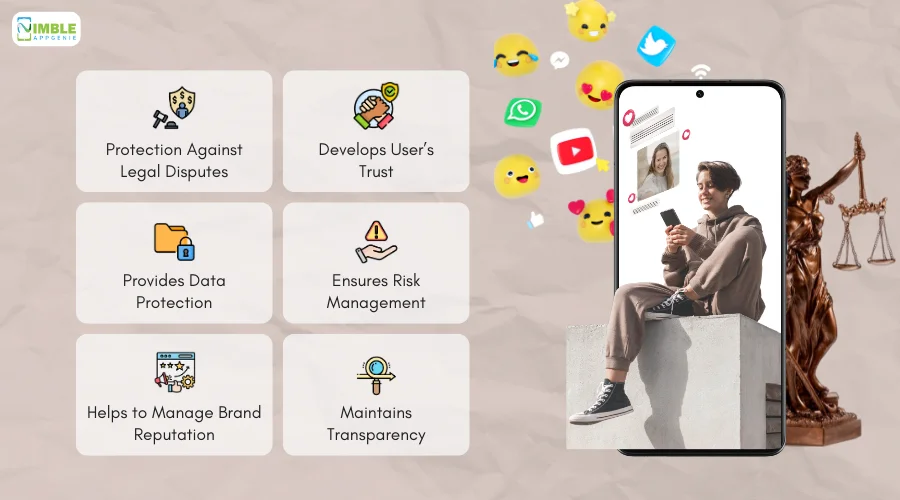
♦ Protection Against Legal Disputes
Implementation of different social media rules and regulations compliance helps businesses to adhere to laws and industry-specific practices.
It gives protection against laws from general data policies to the Freedom of Information Act and assists in maintaining a commitment to operating the business bounding to legal and compliance practices.
This can further mitigate the issue and risks of penalties, legal disputes, and the app’s reputational damage.
♦ Develops User’s Trust
Don’t you want your app user trust to input their sensitive data over it?
Well, then it should be a point of concern. Adhering to the government regulation of social media can assist users to have faith in the process of business to provide them ultimate satisfaction.
You can win users’ beliefs by providing them with data protection, respecting their privacy rights, and maintaining advertising compliance. It will result in building stronger relationships with the app users.
♦ Provides Data Protection
Social media laws and regulations measures are useful for businesses to provide them protection against sensitive shared data.
If your social media startup business is implementing and adopting effective security protocols, that provide access control and consent mechanisms, then you have won the half-race.
Performing GDPR for social media apps can help in mitigating the risk related to data breaches or unauthorized access.
♦ Ensures Risk Management
Social media compliance tools are effective in controlling risk and are designed to minimize reputational damage.
It helps to mitigate legal issues and any kind of public relations crises. Through regular monitoring and performing audits, you can identify potential compliance gaps and overcome them on time.
Timely detection of legal issues can assist you in addressing the potential problems related to regulations before they even occur.
♦ Helps to Manage Brand Reputation
Regulations of social media platforms are proactively helpful in managing brand reputations.
Through monitoring social media activities, businesses can identify and address potential issues comprised of customer complaints, negative sentiment, or harmful content.
Social media compliance monitoring is useful to enable timely intervention that is further effective in maintaining a positive business image.
♦ Maintains Transparency
Government regulations on social media are useful to maintain transparency.
Through rules and regulations, businesses are bound to keep their accounts transparent which opens investment opportunities and increases users’ trust.
Regulation of the internet and social media are built to develop a clear mechanism useful for your business to increase its expansion to reach potential users.
These were some of the advantages to implement social media compliance and strategies for the business.
Now, its time to learn some of the important social media regulations.
The next section will discuss the same.
General Social Media Regulations
Till now, we have discussed the concept of social media regulations, and its importance.
Here are some of the Social media laws and regulations that should be followed before developing an app like Instagram.
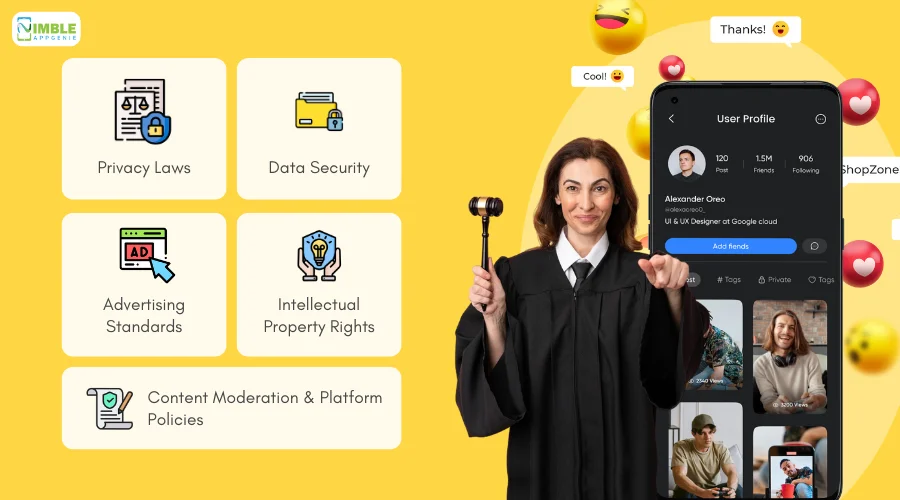
1. Privacy Laws
- General Data Protection Regulation (GDPR)- GDPR regulation applies to all types of industries for handling users’ personal information with care. GDPR social media compliance is created by the European Union (EU) for protecting the personal as well as private data of the users. You should keep the users’ data with safety under these practices.
- California Consumer Privacy Act (CCPA)- With the help of this regulation, citizens of California have more control over the information and how it is being used or shared. They are even authorized to delete the personal information that has been collected about them.
- Family Education Rights and Privacy Act (FERPA)- This social media compliance is designed to protect the privacy of student education records, majorly for educational institutions and agencies. Under this policy, social media cannot be used to showcase information including student’s grades to sell their course plans.
2. Data Security
- Personal Data Protection Act (PDPA)- This regulation can be found in many countries as it contributes to governing the collection, disclosure, and use of personal data. Here social media apps should include these practices to enable the protection of the users’ data.
- Children’s Online Privacy Protection Act (COPPA)- Here you should impose requirements over the online apps that provide services that are directed at children who are under 13 within the United States.
3. Advertising Standards
- Federal Trade Commission (FTC)- Within the U.S., the FTC guidelines are built for performing advertising on social media platforms which should be truthful and non-deceptive. It is used to prevent any unfair methods and acts that have an impact on commercial practices.
- Advertising Standards Authority (ASA)– It is one of the self-regulatory authorities of the advertising industry within the United Kingdom. The ASA rules on social media advertising are essential to follow for ensuring that the content is not misleading, offensive, or harmful.
4. Intellectual Property Rights
- Digital Millennium Copyright Act (DMCA)- This is a 1998 United States copyright act that provides guidelines which state an important part of the relationship between the internet and copyright. It protects copyright infringement content over social media.
- Trademark Laws- This law protects against the unauthorized use of trademarks and also ensures that brands should protect their intellectual property and content over social media platforms.
5. Content Moderation and Platform Policies
- Under AB 587, social media apps and services need to describe their terms of service along with the user’s flag content and groups. They also prohibit social media platforms from changing their content moderation policies more than once every 30 days. The government is authorized to impose additional regulations on content moderation.
These are some of the social media regulatory practices that should be considered before you launch your app.
Now, let’s move on to common social media compliance risks.
Common Social Media Compliance Risks
What can be the result of social media regulations and compliance negligence?
If you think to overlook social media app compliance practices, here’s the list of consequences.
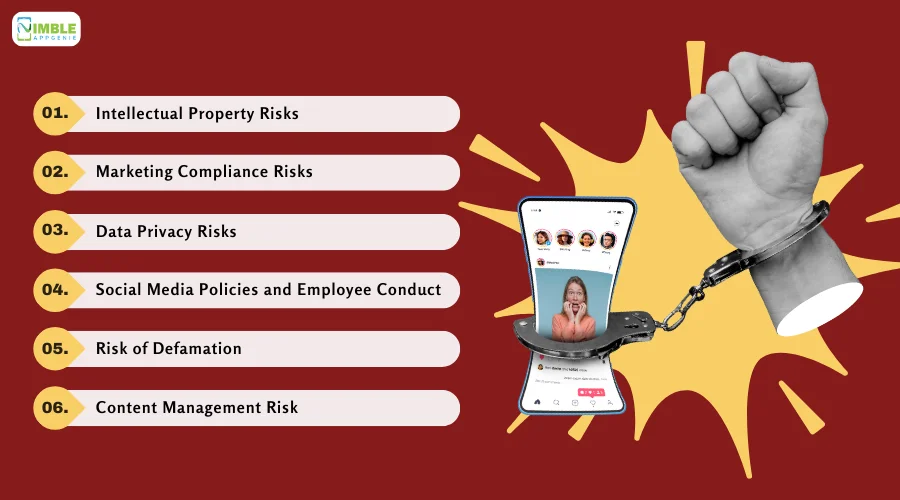
-
Intellectual Property Risks
The role of Social media platforms comprises of sharing as well as distribution of content based on users’ demands. One of the important risks to be considered is the challenge of copyright and trademarks. This is a common risk to be considered and failure can lead to disputes and financial penalties.
-
Marketing Compliance Risks
In the current era, social media platforms are used for advertisements and marketing purposes. Avoiding the advertising laws and guidelines can result in imposing fines, penalties or even shutting down of businesses. Here violations include misleading, lack of proper disclosure of information, etc.
-
Data Privacy Risks
An important social media compliance risk comprises protection against sensitive information. Protecting the data is one of the important parameters that can affect complete business operations. Its avoidance can result in imposing serious penalties and fines along with reputational damage.
-
Social Media Policies and Employee Conduct
If your social media app doesn’t comply with the related policies then you can lose its position in the market. This can even lead to failure. These policies have a certain impact on an organization’s reputation and guidelines. Along with this, guidelines regarding employee’s social media usage should be monitored.
-
Risk of Defamation
According to GDPR and social media policy, it is essential to include lawsuits for libel or slander to avoid defamatory content that can damage or harm the overall reputation of the business. Avoidance can hamper the affected person or business and can injure their social image.
-
Content Management Risk
If you fail to remove and monitor the content based on misleading information, then it can enhance the risk of survival in the competitive market. There is a risk of not adhering to the platform-specific guidelines and with the terms of service.
Avoidance of risk management practices can fail the app.
Now, if you want to head one step ahead of your competitors then the next section is must read.
Tips to Implement Social Media Compliance Suitable for Your Business
You should go through certain tips to implement for social media compliance that are suitable for your business. These tips are stated towards regulatory compliance of social media for assisting you to implement related policies.
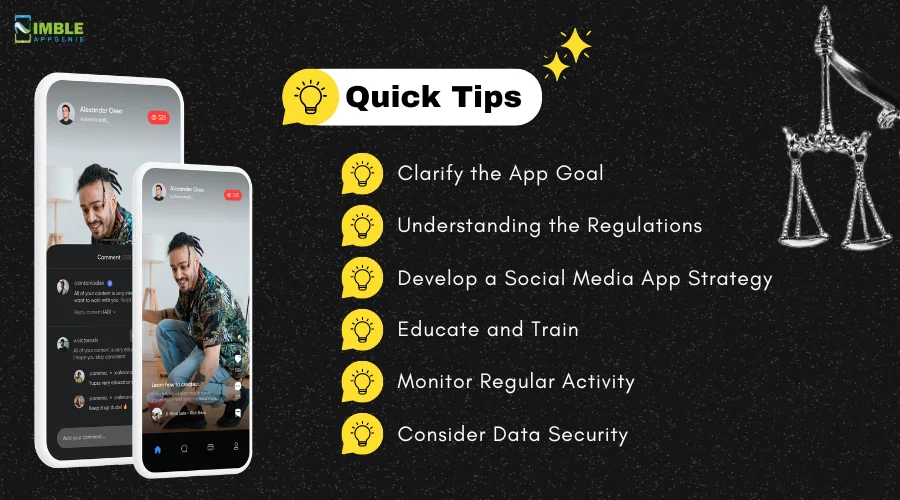
► Clarify the App Goal
You should be very clear about the service that your app will provide. Clarification of the goal is the foremost step towards deciding social media compliance.
Understanding the app’s aim will be useful for staying updated with the concerned rules and regulations.
► Understanding the Regulations
Understanding the social media regulations should be your next step toward implementing suitable compliance practices for the business.
You should go through all the social media compliance and regulations related to content and its justifiable format.
► Develop a Social Media App Strategy
The strategy that can include social media app design, its related features, and other elements should be considered by considering compliance.
Here, the strategy must comply with social media regulations because this is the only way to implement laws based on current government practices.
► Educate and Train
Within a social media app enterprise, you should educate the employees about current rules and regulations as they can impact the complete functioning of the business.
You can hire external authorities or can hire mobile app developers if it’s your first social media app in this industry.
► Monitor Regular Activity
You should monitor the daily and regular activity over the social media platforms. A check over the current social media laws and regulations should be made to enable effective control over content.
A regular check over the regulations may help in continuously scaling up the app as per changing rules about social media.
► Consider Data Security
Avoidance of data security can result in losing the target audience and even failure of the app. Hence, you should consider related and updated data security social media regulatory compliance.
It enhances overall brand reputation and scales up the app’s performance within the competitive business environment.
Connect With Nimble AppGenie to Know the Right Compliance for Your App
Are you still confused to implement effective social media compliance practices for your app?
Connecting with an experienced firm can help here. Nimble AppGenie is the best social media app development company that is willing to help implement social media practices for your business growth.
We have the best panel of experts who can guide you over social media compliance practices and can implement the same in your dream app.
Conclusion
Social media compliance practices are all about the strategies that should be adopted to protect the users’ interests. These are the set of laws designed by the regulatory practices and can help protect against legal fines or penalties.
Such social media regulatory practices can develop users’ trust and maintain transparency. Apart from this, there are a significant number of risks that should be considered including marketing compliance, data privacy, and risk of defamation. Although the right app development team can help you to overcome such challenges.
There are multiple regulations comprised of GDPR, PDPA, ASA, FTC, etc. that can be adopted to avoid any risk of penalties or failures. Further, connecting with a reputation firm can help you here.
FAQs
Social media compliance refers to the adherence to a set of rules and laws created by governments or regulatory bodies to protect users’ sensitive information, data privacy, intellectual property rights, and online content on social networking platforms.
Following social media compliance is crucial as it helps protect against legal disputes, develop users’ trust, provide data protection, ensure risk management, manage brand reputation, and maintain transparency. Without compliance, an app cannot be sanctioned for use by the public and may face legal penalties.
Common risks include intellectual property risks, marketing compliance risks, data privacy risks, non-compliance with social media policies and employee conduct, defamation risks, and content management risks. These can lead to legal disputes, financial penalties, and reputational damage.
Key regulations include privacy laws like GDPR and CCPA, data security laws like PDPA and COPPA, advertising standards from the FTC and ASA, intellectual property laws like the DMCA and trademark laws, and industry-specific regulations like HIPAA and FINRA.
Businesses can ensure compliance by clarifying the app’s goals, understanding the relevant regulations, developing a social media app strategy, educating and training employees, monitoring regular activity, and considering data security measures. Regular audits and updates to align with changing regulations are also essential.
Social media compliance offers several benefits, including protection against legal disputes, enhanced user trust, robust data protection, effective risk management, improved brand reputation, and greater transparency. These benefits collectively help in building a stronger, legally sound business presence on social media.

Niketan Sharma is the CTO of Nimble AppGenie, a prominent website and mobile app development company in the USA that is delivering excellence with a commitment to boosting business growth & maximizing customer satisfaction. He is a highly motivated individual who helps SMEs and startups grow in this dynamic market with the latest technology and innovation.
Table of Contents




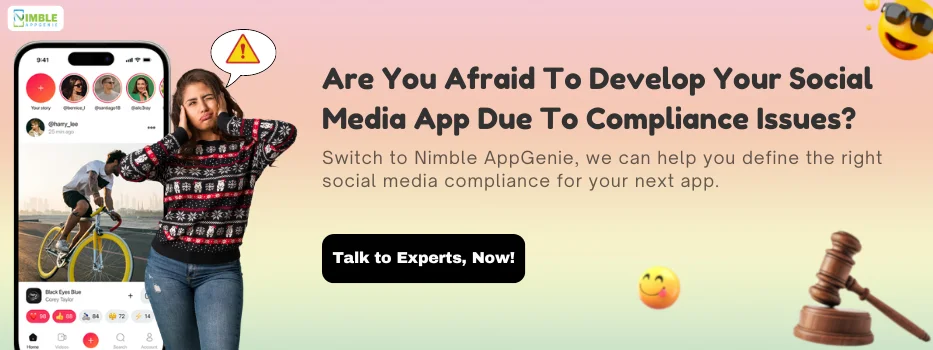
No Comments
Comments are closed.